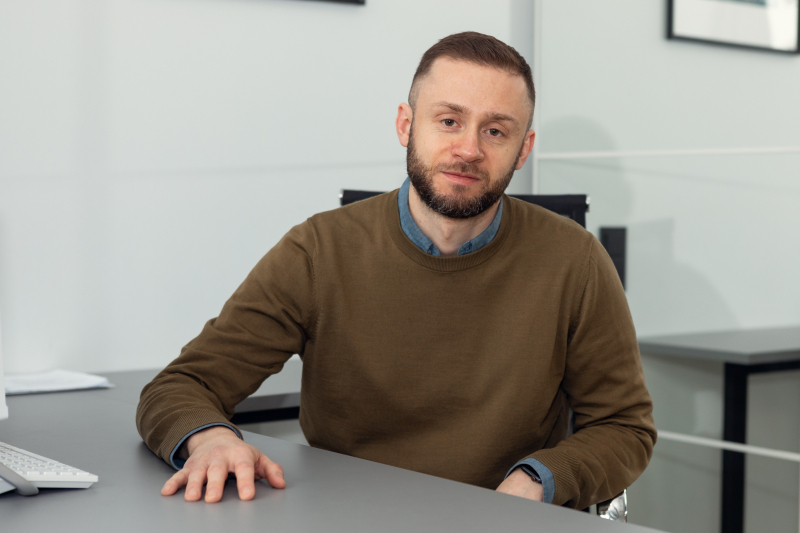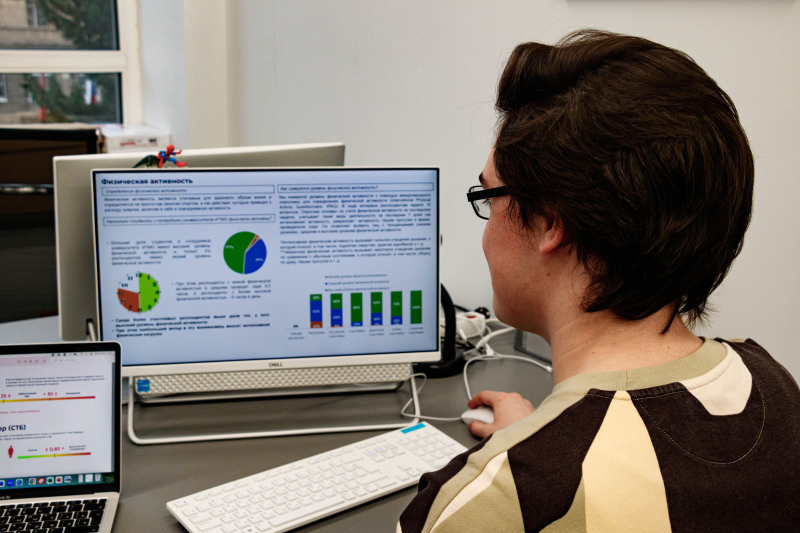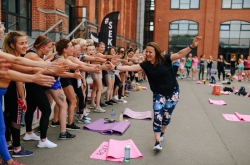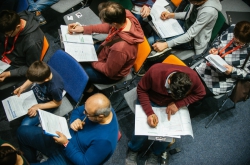The study
Held under the guidance of Ekaterina Aleksandrova, an economist and an expert at ITMO’s Center for Science Communication, the study aimed to identify the factors that affect the health and overall quality of life of ITMO.Family. Mental stress, intensive work and studies schedule, a lack of free time, and relocation – all these have a significant impact on one’s lifestyle and the development of unhealthy habits, as the survey showed.
The project was initiated back in January 2022. Within six months, a team of sociologists, economists, epidemiologists, and science communicators from ITMO and the Higher School of Economics developed a survey methodology, as well as criteria for evaluating health indicators and a questionnaire for self-assessment.
Experts collected participants’ physical data, including body mass index (BMI), blood pressure, heart rate, and handgrip strength, and asked them to self-evaluate their level of physical activity, sleep duration and quality, diet, and bad habits. A portion of the questionnaire was devoted to mental health, namely stress levels and satisfaction with life.
As noted by Anton Barchuk, an associate research professor and the head of the Master’s program in public health science at ITMO, the research initiative is a unique opportunity to test out hypotheses in lifestyle changes and shift the focus from treating diseases to preventing them at a young age.
“First and foremost, we will explore strategies for introducing common prevention methods such as quitting smoking and regular exercise by demonstrating the opportunities to do sports at the university. Besides, we’d like to study the lesser-known yet no less crucial health conditions, such as eating disorders and chronic eye diseases. For instance, we use a special mobile fundus camera to obtain appropriate images of the fundus and eyes to study eye diseases in an academic environment. We hope that the university’s expertise in computer vision will help address students’ vision problems,” states Anton Barchuk.

Anton Barchuk. Photo by Dmitry Grigoryev / ITMO.NEWS
Read also:
Expert in Health Economics Ekaterina Aleksandrova on How to Evaluate Well-Being
Results
The survey showed that 95% of respondents consider their health good, very good, or great, however, only 18% of them proved to have good health. Such a low result is mainly down to the presence of depression, anxiety, chronic pain, or other physical discomfort (53% of people surveyed complained about periodic pain).
The great majority of participants (84%) are completely satisfied with their lives and 65% consider themselves happy, whereas 67% have depression symptoms and anxiety and 63% experience psychological distress (e.g., fatigue, sadness, anxiety, fear, anger, mood swings, and self-isolation).
The share of satisfied people appears to be higher among those who exercise regularly, especially when it comes to intense workouts, as noted by the experts.
Interestingly, there are far more happy people among students who have moved to St. Petersburg rather than among those who have lived here their whole lives.
As for sleep duration and quality, the researchers noted a rather favorable situation: only 23% of participants are sleep-deprived and most of ITMO staff and students sleep an average of seven hours a night (74%). Sleep problems are more common in students who live in dorms, whereas people who rent apartments (followed by those who live with their relatives and friends and then those who have their own apartments) have the best sleep.
Only 20% of people admitted to smoking, with half of them preferring e-cigarettes, and the number of those who drink correlates with the level of experienced psychological distress. The study showed that there are more people who drink three or more standard servings at a time among those suffering from psychological distress.
The experts were most surprised with the number of people with eating disorders (84% of respondents have unhealthy relationships with food). A lot of people were found to be following strict diets or severely limiting their intakes, while others struggle with emotional eating.
What’s next?
The authors of the project have already compiled recommendations on how to improve sleep quality, eat healthy, reduce alcohol consumption, and cope with psychological distress. Aside from that, they are also working on a list of events and measures meant to improve the well-being of students and staff. Thus, regulating the humidity in classrooms is supposed to reduce complaints about vision problems, and food diaries can help people improve their eating habits. Most of the hypotheses are associated with the relationships between exercise and quality of life.
“We’re asking ourselves: what can we, as a responsible employer and a university that prioritizes well-being, do to help our students and staff be happy and healthy, as well as figure out which factors affect the situation. We identify key risk groups offering clear and easy-to-use methods to fight negative effects and are going to come up with a set of tested health policies together with other specialized units. I think that we’re the first among Russian universities to conduct such a survey that comprehensively analyzes the well-being of its students and faculty,” comments Arsen Davitadze, a leading expert of the project and an associate professor at ITMO’s Institute of International Development and Partnership.

Arsen Davitadze. Photo by Alina Melnikova / ITMO.NEWS
In December, the researchers announced the start of the second stage of the project, which is expected to attract around 1,600 participants. They expect a similar interest from the audience since the survey is a great chance for participants to not only join a large-scale study but also learn more about their personal health.
The second survey will take place from December 13 till late March at ITMO campuses on Kronverksky Pr. 49 and Lomonosova St. 9, as well as other locations. Participants will receive feedback and test results within several weeks.
To sign up, go to ISU and submit an application through the Administrative services (Административные сервисы) tab.





